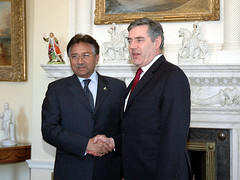NYT: Pakistan’s increasingly assertive Supreme Court ruled Thursday that a political rival to Pakistan’s president, Gen. Pervez Musharraf, can return from exile, throwing Pakistan’s politics into turmoil and threatening the American strategy of support for the president.
The court’s decision dealt a blow to General Musharraf by allowing the rival, Nawaz Sharif, whom he ousted as prime minister in a 1999 military coup, to run for election here this fall.
For the Bush administration, which has backed General Musharraf as a crucial ally in a terrorism hot spot, Mr. Sharif’s re-entry into politics would overturn its plan to prod the general to share power with Ms. Bhutto as a way of keeping him in power, foreign policy analysts said.
“At the very least, he is not a good friend of the United States,” Daniel Markey, a senior fellow at the Council on Foreign Relations and a former State Department official responsible for southern and central Asia, said of Mr. Sharif.
He noted that, as opposed to Ms. Bhutto, Mr. Sharif drew his support more from the right of Pakistan’s politics, including the religious parties. “But then again,” he added, “you can say the same thing about Musharraf.”
The decision also provided a strong indication of the determination of the Supreme Court, and of the newly reinstated chief justice, Iftikhar Muhammad Chaudhry, to challenge military rule.
General Musharraf tried to dismiss Justice Chaudhry in March, but after a five-month battle and nationwide demonstrations, the Supreme Court reinstated him on July 20. Soon afterward, Mr. Sharif and his brother, Shahbaz, filed petitions to the Supreme Court contesting their exile. On Thursday, Mr. Chaudhry, leading a bench of seven judges, declared to a packed courtroom that the Sharifs had an “inalienable right to enter and remain in country, as citizens of Pakistan.”
“We did not take any path of a secret deal with General Musharraf,” Mr. Sharif’s information secretary, Ahsan Iqbal, told reporters outside the court. “Instead, we took a path of transparent judicial courts. Today, by the grace of God, we have been victorious and dictatorship has been defeated today.”
There is no doubt, however, that the ruling is a strong personal rebuke to the increasingly embattled General Musharraf, who said only last week that in the interest of stability, neither Ms. Bhutto nor Mr. Sharif should return before elections.
The decision also provided a strong indication of the determination of the Supreme Court, and of the newly reinstated chief justice, Iftikhar Muhammad Chaudhry, to challenge military rule. General Musharraf tried to dismiss Justice Chaudhry in March, but after a five-month battle and nationwide demonstrations, the Supreme Court reinstated him on July 20.
 Image by Downing Street via Flickr
Image by Downing Street via Flickr



![Reblog this post [with Zemanta]](http://img.zemanta.com/reblog_e.png?x-id=08c0a6a8-e430-4e34-a03a-0a97473f6eb4)




